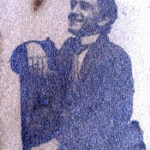 About the author: Joseph John Collins ( October 17, 1877 — July 1, 1946). Born in Philadelphia, PA; died in Philadelphia, PA. Married Elsie Gardner (1907-1981) circa 1903; three children, Mary, Frances Therese and Joseph. Occupation listed as “Wannamakers,” but his enlistment papers lists it as “Electrician.” The Joseph John Collins: Spanish-American War Diary page contains this biographical information:
About the author: Joseph John Collins ( October 17, 1877 — July 1, 1946). Born in Philadelphia, PA; died in Philadelphia, PA. Married Elsie Gardner (1907-1981) circa 1903; three children, Mary, Frances Therese and Joseph. Occupation listed as “Wannamakers,” but his enlistment papers lists it as “Electrician.” The Joseph John Collins: Spanish-American War Diary page contains this biographical information:
His natural parents are unknown (although his mother may have been named Bridget Mulligan). He was adopted in early childhood by the Collins family. His adoptive parents, John Collins and Bridget McMahan, were Irish immigrants from Naas, Ireland who settled in Philadelphia, Pennsylvania in the years just before the American Civil War. Joe Collins served in the Spanish-American War and was stationed in the Philippines. Some years after his return he married and fathered three children before his death July 01, 1946.
His enlistment papers details that he served as a Second Lieutenant in the Philadelphia Volunteers, Co. “D” 47th Regiment, from September 9, 1899 to June 30, 1901. The same papers lists his military service as follows:
Dec 21, 1899. Tried by S. C. Oct 20, 1899 vio 32 AW (absent Oct 14 to 15, 1899 inc) fine $1.50 fine + pay for time absent ded on Oct 1899 P.R. 2nd Jan 22, Nov 28th to Dec 6, 1900 inc all in S. of D —
With Gen Kobbes expdn to So. Luzon to open hemp posts —
Capture of Donsol Jan 21, Matnog Dec. 19, 1900 Eng. v. Skir at Donsel Jan 21, 22, 24, 25, 26, 29, 30, Feb. 8, 10, 24, Mch 1, Apr 21, May 16, 23, June 8, Dec 7, 1900
Eng at Banangaran May 4 Skir at San Vincente May 5 Minniguigui May 5 Matnog Dec 20, 1900
Character excellent. *Service honest and faithful.*From certificate of Co. Comdr.
About the diary: Published online by Ellen Wilds in her website, In Their Own Words: Documents of the Past. The Joseph John Collins: Spanish-American War Diary page contains information on the diary:
Bound in burgundy leather, this diary measures 4×6.5 inches. The pages are lined in blue with a one inch margin marked in red. The handwriting varies from ink to pencil with more pencil entries near the end of the entries. The overall condition of the diary is excellent and the handwriting legible. Punctuation is largely non-existent with one sentence running into the next. The spelling is mostly correct, but with some errors, such as “quite” instead of “quiet.” Capitalization is inconsistent at the beginning of sentences, though it is regularly used for proper names.
In transcribing the diary, Ellen Wilds notes,
One of the more difficult tasks with this diary has been sorting out the proper names, including people, places, and ships. Many of the names are foreign and the author’s spelling varies. I have tried to locate as many of the geographical names as possible.
Notations by the transcriber are in italics, with additional date notations (such as year and month) in italics. Daily dates are in bold although they do not appear that way in the original. This is for the ease of the reader. Wherever text has been struck out it is because it so appears in the original.
In addition, she includes this note of caution:
Mr. Collins’ terminology will offend some, but the transcript is faithful to the original document, including the use of biased language.
The Philippine Diary Project, when encountering words that may benefit from further correction, provides its suggestions in [italicized underlined text within brackets]. The portion of the diary used comprises his period of service in the Philippines, from December 22, 1899 (arrival in Manila), to May 28, 1901 (departure from Manila).